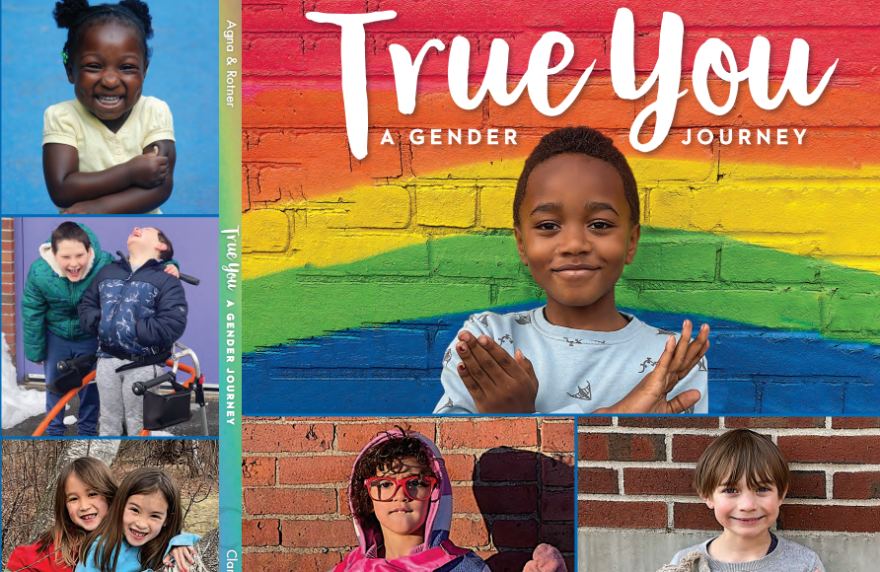Educator Gwen Agna and author-photographer Shelley Rotner wanted to create a book to help elementary and middle-school students explore the meaning of gender. They say many kids are starting to reject the male and female binary altogether.
Agna is a former principal at Jackson Street School in Northampton, Massachusetts, and current school committee member. She and Rotner collaborated on “True You: A Gender Journey.”
Rotner began our interview by sharing her favorite line from the book:
Shelley Rotner: I know this is radio and you can't see this, but this is a spread in the book, and the words are: "There are different ways to show and be who you are. It's up to you — how you feel, how you dress, how you act, how you play, learn, and love."
Gwen Agna: And if I may add one other, that there's a child who says, some days I feel like a boy and sometimes I feel like a girl and it really doesn't matter. I love cars and my bunny.
Nirvani Williams, NEPM: I love that the kids speak so simply, yet powerfully in explaining how gender is a spectrum. And I wanted to know what prompted you both to make a book dedicated to breaking down these socialized gender norms and making gender expression accessible for kids.
Gwen Agna: It's often so much easier to hear a book or to hear children talking in a book than being lectured to about these things. And I think that, for me, was the most powerful thing about this, that we could get children to speak their truth and be seen that way and for other children to see them.
I learned a lot, as Shelley said, in writing this, but I also learned a lot in my time at Jackson Street. This one little girl raised her hand and said, "So, Ms. Agna, if you were born now, do you think you would want to be a boy?" And it was such a good question. And I said, "Well, that is a good question. I like being a girl, but I really wanted to be able to do whatever I wanted to do. I wanted to be able to play sports. I wanted to not have to wear a dress. I wanted to be who I was, and it didn't mean that I had to be somebody else. I just wanted somebody to acknowledge that it was OK for me to be that way."
Shelley Rotner: Yeah, that's great. I think it's empowering and that's one of the things that, a takeaway, that the children felt that sharing this, then the world gets bigger.
I see that you also chose not to include the names of the kids shown in your book and I wanted to know why that was?
Shelley Rotner: I think it comes down to safety. As time goes on, and with all social media, you know, we have to protect our children in every way.
Gwen Agna: Yeah. And when we were given the what they call the model releases, which are the permission slips to give to the families, the first one that we got said that we would use their names. And we immediately focused on that and said to the editor, we can't do that. We didn't think the families would go for that and we didn't want to expose them [to] any possibility of being identified, and then anything that can happen that happens on the internet these days. So it was all about safety and support and respect.
How do you feel teachers should react when kids are figuring out their identities at school, but haven't come out to their parents yet? I know we saw this in a recent case in Ludlow, and I wanted to know your thoughts.
Shelley Rotner: Part of our intention for this book is that it serves as a catalyst for conversation. We know that there's a wide range of teachers and some are more informed. And Gwen, maybe you could talk about your curriculum and informing teachers better, just like parents and friends, how to respond.
Gwen Agna: I think it's really important for teachers and their principal or the school counselor or whoever to be open and listen to the families if they're concerned that, you know, their child came home and said, I decided that my pronouns are she and her, instead of he and him. Rather than get upset about it, to turn to the educators in this case and to have a place that they can go and and find out rather than quickly, you know, call the superintendent and say, "They're talking about these things in my school." We would hope that this could be done proactively.
And I think a book like this does it proactively. I think that teachers can do it proactively, as well, so that they establish a culture of their classroom, that this isn't something that the children have to feel that they have to hide from home, or that they don't even need to necessarily always share at home. ... Children are very wise. And I think that they may know that when it's time to help their their grown grownups understand what's going on for them, that they will do it when it's time.







